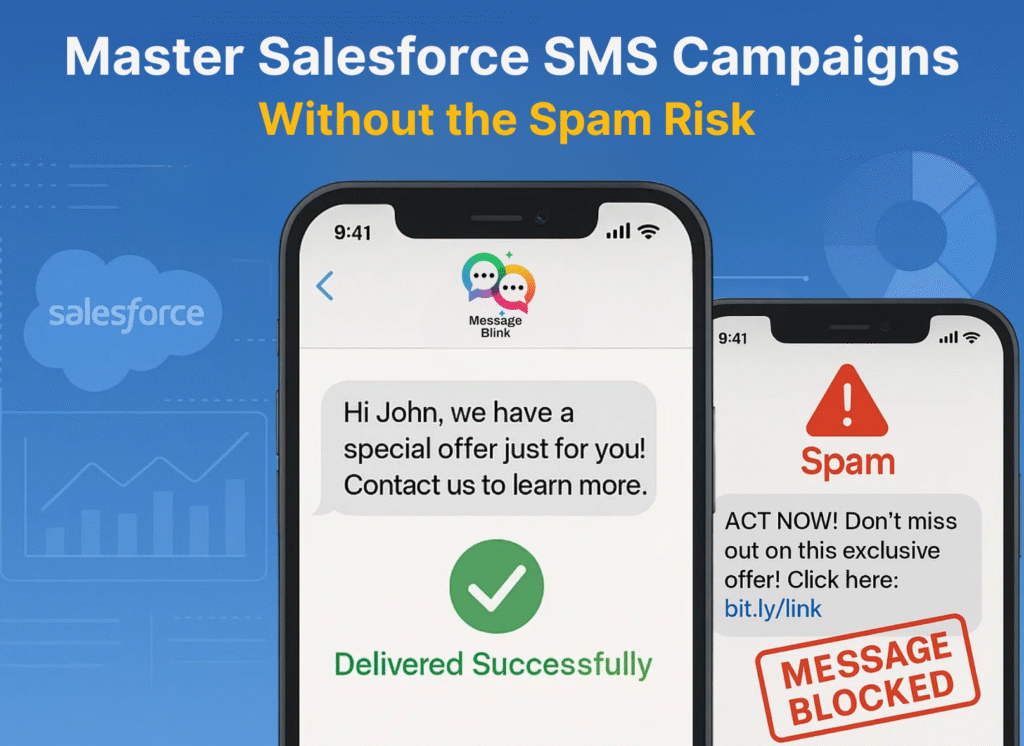SMS remains one of the most powerful tools for Salesforce-driven lead generation and customer engagement. With open rates as high as 98%, it’s hard to ignore. However, in regulated markets like the US and UK, SMS campaigns can quickly get flagged as spam, blocked by carriers, or worse- lead to costly compliance violations.
Many marketers face these common challenges:
- SMS being flagged by spam filters
-
Rising opt-out and complaint rates
-
Inefficient manual workflows
-
Low engagement and ROI
So, what’s causing these issues- and how can you avoid them?
What Triggers SMS Spam Flags in Salesforce Campaigns?
1. Content Pitfalls
-
Sending generic, repetitive, or promotional content (e.g., “BUY NOW!”)
-
Overuse of all-caps, words like “FREE,” or misleading offers
-
Including URLs (e.g., bit.ly links) that aren’t branded or are commonly associated with spam
2. Timing and Frequency Risks
-
Sending outside 8 AM–9 PM local time violates “quiet hours” rules.
-
Overloading contacts with more than 2-4 messages weekly, especially without personalization.
3. List Hygiene and Consent Gaps
-
Using purchased, outdated, or unverified lists with invalid numbers.
-
Missing explicit opt-in records, violating SMS marketing compliance laws like TCPA or GDPR.
-
Delaying opt-out processing or ignoring STOP requests
4. Automation and Compliance Failures
-
Not logging consent or opt-outs for each contact
-
Not registering 10DLC or short codes with The Campaign Registry, lowering sender reputation.
-
Failing to use Salesforce or third-party tools for compliance automation
How to Avoid Spam Flags in Salesforce SMS Campaigns?
To ensure Salesforce SMS campaigns maintain high deliverability and avoid getting flagged as spam, always secure clean opt-in consent, use segmented and personalized messaging, leverage AI-powered automation, employ sender verification, and track engagement metrics using Salesforce-native tools like Message Blink. Immediate opt-out options, compliance with TCPA/GDPR, and data-driven segmentation are critical for success
SMS Deliverability Best Practices for Salesforce Campaigns
1. Secure and Documented Opt-In
-
Use double opt-in for accuracy.
-
Store consent records in Salesforce data extensions (fields: mobile number, consent date, subscriber key) for TCPA/GDPR audits.
-
Reconfirm consent annually to maintain list hygiene.
2. Sender Reputation Management
-
Register 10DLC numbers or short codes with The Campaign Registry (3–5 days for approval). This verifies your brand and improves deliverability.
-
Always include your brand name in the message body
-
Start with low volumes (e.g., 100 messages/day) to build trust with carriers.
3. Message Optimization
-
Keep messages under 160 characters
-
Place priority information at the start
-
Limit to 2-4 marketing SMS per month per contact
-
Personalize messages based on segmentation and behavior, ideally using AI (Agentforce)
4. Smart Segmentation and List Hygiene
-
Clean lists monthly, removing invalid or inactive numbers to reduce bounces.
-
Segment based on engagement, behavior, demographics, or journey stage
-
Segment by behavior (e.g., recent purchases), demographics, or location using Salesforce Data Cloud for relevance.
5. Intelligent Timing
-
Schedule sends between 9 AM and 8 PM in the recipient’s time zone
-
Use Salesforce AI or Message Blink to identify optimal send times by analyzing past engagement
Salesforce-Specific Strategies for Spam-Free SMS Campaigns
Salesforce’s ecosystem offers powerful tools to enhance Salesforce SMS automation and deliverability:
1. Using Salesforce MobileConnect and Journey Builder
-
Build opt-in/out automations natively with MobileConnect
-
Design multi-channel journeys in Journey Builder, blending SMS with email or push notifications to reduce spam risks. Example: Send an SMS reminder after an email offer.
-
Trigger SMS based on Salesforce object updates, like a lead moving to “qualified.”
2. SMS List Segmentation with Salesforce Data Cloud
-
Sync CRM and behavioral data to create dynamic segments (e.g., “high-value customers” or “cart abandoners”).
-
Update segments in real-time with Data Cloud, ensuring messages align with recent interactions, reducing irrelevance and spam flags.
3. Automation with Flow Builder, Journey Builder, and AI
-
Automate compliance, unsubscribe, and opt-in tracking with Flow Builder
-
Use Journey Builder for drip campaigns, spacing SMS sends to avoid over-sending.
-
Tap AI features (like Agentforce or Einstein) for send time prediction, content personalization, and workflow optimization
How Message Blink Takes Salesforce SMS Campaigns?
Message Blink, a Salesforce-native app on AppExchange, built by EX-Salesforce ISV PAM, fills critical gaps with AI-driven, compliance-focused features designed for US and UK marketers:
1. Automated Compliance
- Automates double opt-in workflows and logs consent in Salesforce records for instant audits.
- Processes opt-outs instantly via keywords like “STOP,” syncing with CRM to prevent resends.
- Provides proactive compliance alerts, flagging potential TCPA violations before sends. Example: Alerts if a campaign lacks opt-in records for 5% of recipients.
2. Enhanced Deliverability
-
Supports branded sender IDs and 10DLC/short code registration for 98%+ delivery rates.
-
Proactive spam risk scoring and recommendations before sending
-
Automatic, AI-driven segmentation to minimize risk and maximize engagement
3.AI-Powered Segmentation and SMS Personalization in Salesforce:
- Integrates with Data Cloud for dynamic, behavior-based segments (e.g., “frequent buyers” or “inactive for 30 days”).
- Uses Agentforce AI to craft personalized texts based on sentiment or purchase history. Example: “Hi John, loved your last purchase! Reorder [Product] at 20% off: [URL].”
- Predicts optimal send times, reducing opt-outs by up to 30% compared to generic scheduling.
4. Seamless Salesforce SMS Automation:
- Offers one-click campaign setup in Flow and Journey Builder, no coding needed.
- Automates multi-channel workflows (SMS, WhatsApp, email) from a single dashboard.
- Uses AI to escalate conversations, like routing a reply to a live agent if sentiment is negative.
5. Actionable Analytics Dashboards:
-
Tracks deliverability (95%+ goal), bounces, opt-outs, and conversions in real-time.
-
Provides AI-driven insights, e.g., “10% of this segment opted out due to high frequency-reduce to 2 sends/month.”
Actionable Checklist for Salesforce SMS Campaign Marketers
| Action | Must-Do Best Practice |
|---|---|
| Collect Opt-In | Use double opt-in, capture every consent change in CRM |
| Automate Opt-Outs | Implement STOP/UNSUBSCRIBE keywords, automate removals instantly |
| Register Sender ID | Use branded sender names and pre-approved shortcodes |
| Personalize Content | Segment with Data Cloud; use AI to vary messages and boost engagement |
| Control Cadence | Limit frequency, use analytics or AI for optimal send times |
| Clean Lists | Remove invalids; update segments using Salesforce Data Cloud |
| Monitor Performance | Use dashboards for deliverability, opt-outs, conversions |
| Stay Audit-Ready | Export consent logs, segment data, and compliance reports |
Conclusion & Call to Action
For US and UK marketing teams using Salesforce, SMS is your most powerful channel-when it’s done right. By following deliverability-first, compliance-driven practices and amplifying your workflow with Message Blink’s Salesforce-native tools, you can ensure every campaign cuts through, wins engagement, and never lands in the spam folder.
Get started with Message Blink to automate compliance, optimize deliverability, and enjoy effortless, high-converting Salesforce SMS campaigns- every time.


